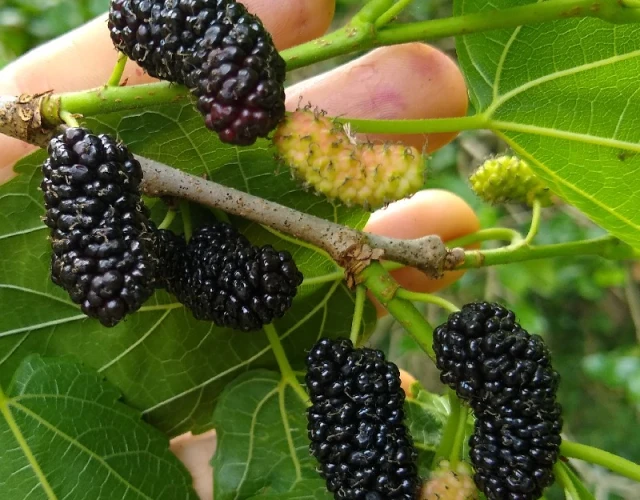
Description
This hardy mulberry selection bears sweet, blackberry-like fruit over an extended season. In trials and long grower experience with hardy everbearing types (e.g., ‘Illinois Everbearing’), plants tolerate winter cold to roughly −20 °F, grow quickly, and fruit reliably once established. Fruit ripens over weeks rather than all at once—ideal for fresh snacking with minimal processing.
Mulberries are adaptable and low-input once established. Train early for strong structure; keep height in check with summer tipping to simplify harvest and netting.
Growing Info
- Site: Full sun; adaptable soils with good drainage.
- Size: Prune to maintain a manageable canopy; avoid heavy winter cuts on large limbs (mulberries bleed).
- Yield window: Typically late spring through mid-summer, often continuing in waves.
- Notes: Birds love the fruit; netting can be helpful at peak ripeness.
Technical Specs
| Species | Morus alba × rubra (hardy mulberry selection) |
|---|---|
| Cultivar | Often sold as ‘Illinois Everbearing’ class |
| Type / Habit | Fast-growing, productive small tree |
| Ripening window | Extended—often late spring through mid/late summer in waves |
| Bearing | On current-season growth from established framework |
| Hardiness (USDA) | Zones 5–9 (reports colder with protection) |
| Sunlight | Full sun |
| Soil / pH | Adaptable; prefers well-drained soils; pH 6–7.5 |
| Water | Low to moderate once established; regular water improves fruit size |
| Spacing | As a tree 12–18 ft; can be kept smaller with pruning |
| Trellis | Not required |
| Pollination | Generally self-fertile; single tree sets |
| Height x spread (managed) | 8–15 ft with pruning; can grow larger if unpruned |
| Pruning | Favor summer tipping/size control; avoid heavy winter heading on large wood (bleeding) |
| Disease / pests (notes) | Typically low-maintenance; bird pressure can be heavy at peak ripeness |
| Primary uses | Fresh eating, pies, dehydrating, preserves |
Shipping & Guarantee
Ships Mon–Wed with heat-aware holds. 14-day establishment guarantee.
